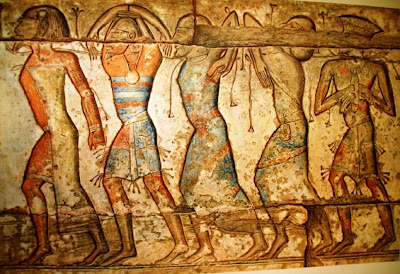Switching off the Blame Machine - Torah portion Beha'alot'kha
Numbers 11 begins with a brief yet violent episode:
Ravaged by fire, the people cry out to Moses, who entreats YHVH on their behalf and the flames subside. The place is then called Tav'era for the "burning" that took place. The whole incident takes up a mere three verses (Num 11:1-3), and we never hear about the reason the people were upset to begin with.
Mit'onenim as "self-aggrieved"
What did the people do which caused YHVH's anger to flare? They are described as "mit'onenim ra." The verb hit'onen (התאנן) occurs one other time in the Bible, in Lamentations 3:39: "Why should a living human yit'onen, a man regarding his sin?" Both cases are typically understood to mean complain, grumble or murmur. [1] However, the verb is widely thought to stem from anan (אנן), which means to mourn or sigh [2], leading some to employ the translation "grieve." [3]
My above translation is based on the reflexive hit'onen, rendering it "make oneself aggrieved," or simply "self-aggrieved." Meaning, even if the people's distress was linked to an external issue [4], that sense of being aggrieved took on a life of its own. I chose the translation "evilly" for ra, as opposed to "bitterly," wanting to convey how it must have been perceived to YHVH to warrant such a severe and violent reaction. (Though I cannot possibly see anyone's complaint or aggravation being so "evil" as to merit being burned alive. Or more precisely, I can understand it from an Iron Age perspective, just not according to modern ethical sensibilities.)
Seeking a pretext
But I want to focus on this idea of being "self-aggrieved," where the self-generation or perpetuation of the aggrieved state is the primary interest of the story, as opposed to any external causes of distress. The Midrash Sifrei on this episode views the word mit'onenim as stemming from ta'ana (תאנה), which means "occasion" or "pretext." According to the Midrash, the people involved sought any pretext to distance themselves from YHVH. [5] To what end? Judging from other instances in the Torah, it's a reasonable bet that they wanted to abort YHVH's mission and return to Egypt. [6]
The advantage of this interpretation is that it explains why the story offers no explanation for the complaint - because it wasn't really about any one issue or problem. The people were ready to point to anything as the alleged reason for being aggrieved, as long as it presented something concrete to latch onto, an anchor to place blame.
Psychological takeaways: More self-awareness, less blame-fixation
The self-perpetuating, blame-seeking connotation of the word mit'onenim is something we all engage in to a degree. We have a certain feeling, mood or emotion ("A"), then point the finger at what we determine to be the reason ("B"), and then the conversation ends up focusing exclusively on the alleged reason, even when the causality of B leading to A is dubious at best.
For instance, when I'm feeling down and someone asks me, "What's wrong?" my first instinct is to pick out one or two things that aren't going well, or else enter into a litany of all the various problems I'm currently dealing with. But did any of these things "produce" the mood I'm experiencing? Is my feeling really the "result" of these things? After all, some of the supposed "reasons" I'd point to are no doubt chronic issues, and it's not as if I'm in a bad mood perpetually.
Yes, there are times when a specific event precipitates a feeling of distress. But even then, I wouldn't call it a "causal" relationship, since the meaning we attach to the events in our lives is really up to us. We don't have to react in one particular way. And much of the time, it's not even a question of a specific event. We start with "A," the feeling or mood, and "B" is simply something we latch onto, point to, place the blame on, because it's the lowest hanging fruit, the first issue that comes to mind. And then all the energy goes into how to deal with "B," which may in fact blow the issue of B out of proportion, in addition to it not being the true "cause" of the mood.
Moods and feelings arise for any number of complex reasons, from subconscious memories triggered, to physical sensations like hunger or exhaustion, to minor interpersonal exchanges or things we've watched or read which leave us with a certain feeling. It's a confluence of factors which are often difficult to trace or articulate.
So what can we do when we feel ourselves upset or aggrieved? Several things: We can be aware, wiser, about not automatically falling into the trap of reacting to the mood by attaching it to "things" in our lives - or people - which aren't really the cause. In other words, switch off the blame machine. We can recognize that a mood isn't "caused" and outside our control. It is ours to shape, to change as we wish, and to utilize constructively. And last, which I find particularly useful, we can simply take note of the feeling, experience it without "self-aggrieving" and giving it a life of its own, and keep in mind that this too shall pass.
_____________
1. JPS Tanakh, Num 1:11, Lam 3:39; R. E. Friedman's Commentary on the Torah, Num 11:1
2. Brown-Driver-Briggs; Hebrew-Aramaic Lexicon
3. E.g. Baruch Levine, Anchor Yale Bible, Numbers Vol. 1, p. 312
4. E.g. suffering from their journey in the desert as a whole, see Rashbam on Num 11:1.
5. Sifrei Bamidbar 85, cited by Rashi on Num 1:11
6. E.g. Ex 16:3, 17:3; Num 14:3, 16:13
וַיְהִי הָעָם כְּמִתְאֹנְנִים רַע בְּאָזְנֵי יְ-הוָה וַיִּשְׁמַע יְ-הוָה וַיִּחַר אַפּוֹ וַתִּבְעַר בָּם אֵשׁ יְ-הוָה וַתֹּאכַל בִּקְצֵה הַמַּחֲנֶה
And the people became as evilly self-aggrieved in YHVH's earshot, and YHVH heard and he flared his anger, and a fire of YHVH burned upon them, and it consumed at the edge of the camp.
Mit'onenim as "self-aggrieved"
What did the people do which caused YHVH's anger to flare? They are described as "mit'onenim ra." The verb hit'onen (התאנן) occurs one other time in the Bible, in Lamentations 3:39: "Why should a living human yit'onen, a man regarding his sin?" Both cases are typically understood to mean complain, grumble or murmur. [1] However, the verb is widely thought to stem from anan (אנן), which means to mourn or sigh [2], leading some to employ the translation "grieve." [3]
My above translation is based on the reflexive hit'onen, rendering it "make oneself aggrieved," or simply "self-aggrieved." Meaning, even if the people's distress was linked to an external issue [4], that sense of being aggrieved took on a life of its own. I chose the translation "evilly" for ra, as opposed to "bitterly," wanting to convey how it must have been perceived to YHVH to warrant such a severe and violent reaction. (Though I cannot possibly see anyone's complaint or aggravation being so "evil" as to merit being burned alive. Or more precisely, I can understand it from an Iron Age perspective, just not according to modern ethical sensibilities.)
Seeking a pretext
But I want to focus on this idea of being "self-aggrieved," where the self-generation or perpetuation of the aggrieved state is the primary interest of the story, as opposed to any external causes of distress. The Midrash Sifrei on this episode views the word mit'onenim as stemming from ta'ana (תאנה), which means "occasion" or "pretext." According to the Midrash, the people involved sought any pretext to distance themselves from YHVH. [5] To what end? Judging from other instances in the Torah, it's a reasonable bet that they wanted to abort YHVH's mission and return to Egypt. [6]
The advantage of this interpretation is that it explains why the story offers no explanation for the complaint - because it wasn't really about any one issue or problem. The people were ready to point to anything as the alleged reason for being aggrieved, as long as it presented something concrete to latch onto, an anchor to place blame.
Psychological takeaways: More self-awareness, less blame-fixation
The self-perpetuating, blame-seeking connotation of the word mit'onenim is something we all engage in to a degree. We have a certain feeling, mood or emotion ("A"), then point the finger at what we determine to be the reason ("B"), and then the conversation ends up focusing exclusively on the alleged reason, even when the causality of B leading to A is dubious at best.
For instance, when I'm feeling down and someone asks me, "What's wrong?" my first instinct is to pick out one or two things that aren't going well, or else enter into a litany of all the various problems I'm currently dealing with. But did any of these things "produce" the mood I'm experiencing? Is my feeling really the "result" of these things? After all, some of the supposed "reasons" I'd point to are no doubt chronic issues, and it's not as if I'm in a bad mood perpetually.
Yes, there are times when a specific event precipitates a feeling of distress. But even then, I wouldn't call it a "causal" relationship, since the meaning we attach to the events in our lives is really up to us. We don't have to react in one particular way. And much of the time, it's not even a question of a specific event. We start with "A," the feeling or mood, and "B" is simply something we latch onto, point to, place the blame on, because it's the lowest hanging fruit, the first issue that comes to mind. And then all the energy goes into how to deal with "B," which may in fact blow the issue of B out of proportion, in addition to it not being the true "cause" of the mood.
Moods and feelings arise for any number of complex reasons, from subconscious memories triggered, to physical sensations like hunger or exhaustion, to minor interpersonal exchanges or things we've watched or read which leave us with a certain feeling. It's a confluence of factors which are often difficult to trace or articulate.
So what can we do when we feel ourselves upset or aggrieved? Several things: We can be aware, wiser, about not automatically falling into the trap of reacting to the mood by attaching it to "things" in our lives - or people - which aren't really the cause. In other words, switch off the blame machine. We can recognize that a mood isn't "caused" and outside our control. It is ours to shape, to change as we wish, and to utilize constructively. And last, which I find particularly useful, we can simply take note of the feeling, experience it without "self-aggrieving" and giving it a life of its own, and keep in mind that this too shall pass.
_____________
1. JPS Tanakh, Num 1:11, Lam 3:39; R. E. Friedman's Commentary on the Torah, Num 11:1
2. Brown-Driver-Briggs; Hebrew-Aramaic Lexicon
3. E.g. Baruch Levine, Anchor Yale Bible, Numbers Vol. 1, p. 312
4. E.g. suffering from their journey in the desert as a whole, see Rashbam on Num 11:1.
5. Sifrei Bamidbar 85, cited by Rashi on Num 1:11
6. E.g. Ex 16:3, 17:3; Num 14:3, 16:13



Comments
Post a Comment
Not sure how to leave a comment? By "Comment as", either choose your Google ID, OR select "Name/URL". Type your name and leave URL blank (if you don't have a web address). Then hit "Publish", type in the letters/number shown, and again "Publish". I don't mind anonymous comments, but please use a pseudonym.